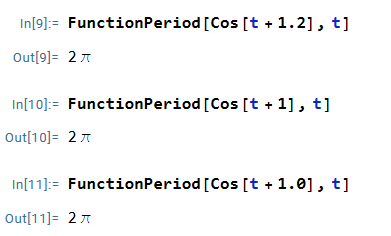I am using Mathematica 10, FunctionPeriod which is supposed to return period of a given function returns 0 if the input trigonometric function have a Real phase
In[1]:= FunctionPeriod[Cos[t+1.2], t]
Out[1]= 0
In[2]:= FunctionPeriod[Cos[t+1], t]
Out[2]= 2 π
In[3]:= FunctionPeriod[Cos[t+1.0], t]
Out[3]= 0
Why the period is zero if the phase is a real number instead of 2 π and why Cos[t+1] and Cos[t+1.0] are not having the same period



Cos[t+1.2+2 Pi] == Cos[t+1.2]$\endgroup$2 Pior "why am I not getting the expected behavior". $\endgroup$Cos[1.] - Cos[1. + 2 Pi]. $\endgroup$FunctionPeriod[Rationalize@Cos[t + 1.2], t]yields2 π. $\endgroup$